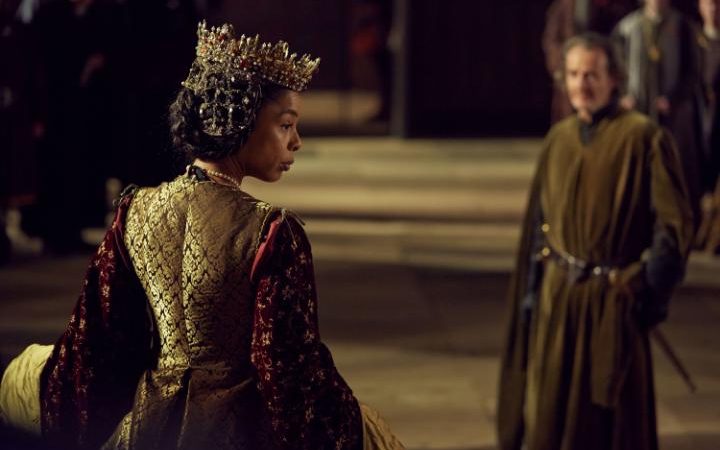God forbid any malice should prevail/That faultless may condemn a noble man.
With Henry VI I’m venturing into unknown territories. The only one of Shakespeare’s histories I’m previously familiar with is Richard III, while the Henries have been just, well, a whole lot of Henries. As luck should have it, all three Henry VI plays are part of the second Hollow Crown cycle on BBC – this is particularly fortunate as the only existing filmatisation of these three plays that I could get hold of is the visually and cinematographically rather dated BBC Shakespeare Collection version from the early 1980s.
In The Hollow Crown, the screenwriters have chosen to condense the Contention (the three Henry VI) plays into two 110-minute episodes, using the play texts in the order of their historical chronological order; in its full length 2 Henry VI alone is well over three hours long. The adaptation has its shortcomings, but it has made me think that the Contention has great cinematic potential – what pity that the screenwriters chose for example to not to explore the rather Gothic storyline of Eleanor attending the conjuration (and had her instead stick needles into a King Henry -shaped voodoo doll), or to show the false miracle of St Albans.
Shakespeare composed Henry VI Part 2 and 3 around 1591, and Part 1 – which deals with the events leading to those in Part 2 – in 1592. The Henry VI plays and Richard III cover the period of English history from the loss of French territories towards the end of the Hundred Years’ War through the Wars of the Roses to the end of the Plantagenet reign. The War of the Roses was a series of battles fought for power between the two Plantagenet families, Yorks and Lancasters, starting with the battle of St Albans in 1455 and ending with Richard III’s defeat at the battle of Bosworth in 1485, when Henry Tudor (later Henry VII) took the English crown. It is a struggle for power between two branches of one family that finishes them both, and the play carries that sense of inevitability.
 2 Henry VI is essentially a play about the king’s weakness as a leader – he became king when he’s just 9 months old, and suffered mental breakdowns through his reigns. At the age of 24 he married Margaret d’Anjou, who was but 15, and – at least in the Shakespearean version of history – the mistress of the Duke of Suffolk. It’s doubtful that Henry ever controlled the throne; in the play he’s a sort of ethereal figure out of touch with the realities of his court, and seemingly incapable of seeing what’s right under nose – a blatant struggle for power among his courtiers, one in which he has no place.
2 Henry VI is essentially a play about the king’s weakness as a leader – he became king when he’s just 9 months old, and suffered mental breakdowns through his reigns. At the age of 24 he married Margaret d’Anjou, who was but 15, and – at least in the Shakespearean version of history – the mistress of the Duke of Suffolk. It’s doubtful that Henry ever controlled the throne; in the play he’s a sort of ethereal figure out of touch with the realities of his court, and seemingly incapable of seeing what’s right under nose – a blatant struggle for power among his courtiers, one in which he has no place.
Suffolk hopes to control the King through Margaret, but finds an obstacle in the Duke of Gloucester, the king’s protector since his birth, and one of the few good men around. Gloucester’s wife Eleanor believes her husband should be the ruler, and she consults Margery Jourdemaine, a necromancer, for a prophecy that would hold promise of Gloucester’s future success. Margery tells her and her ally Bolingbroke that one of the dukes will depose the king, and that Suffolk “by water shall die” – by the end of the play both of these prophecies have come true*. Eleanor is arrested and convicted for using witchcraft to commit treason; she is banished from the court and sent to Isle of Man. The courtiers use this against Gloucester, who is then assassinated on the eve of his trial. Suffolk’s part in his death is revealed to the king by Warwick, and he is banished from the court, despite Margaret’s pleas. He sets to flee to France, but is killed by pirates* (yes, this part really happened) before making it off the English coast. Richard of York, who considers himself the proper heir to the throne, is sent to Ireland to quench a rebellion there. Upon his return he has raised an army, and together with Warwick and Salisbury meets the King’s troops in St Albans, where the King’s supporters, Somerset and Clifford, are killed. The King and Margaret flee with Clifford’s son; York seizes the power*. Shakespeare also sidesteps in the Jack Cade Rebellion; an otherwise minor historical event that in this particular moment exposes the fault lines in the English government and in its way serves as a precursor to the war that is about to begin.
The astonishing thing about the Contention is that it was written at and around the same time as the first two comedies – it couldn’t be further away from them dramatically. 2 Henry VI is unnecessarily complex (it has the largest cast of any of his plays), has a number of side plots that are not exactly necessary, and often longwinded, but it already has the echoes of the later, greater plays in it. Its female characters – manipulative Margaret, greedy Eleanor, and even Margery the sorceress in her small role – are a complete departure from those in the comedies; in many ways they are the men’s equal. They have their own agencies and ambitions, and they maintain strange sort of dignity even at their lowest – Eleanor in her sheet after her public penance (she’s not penitent at all, really) and Margaret carrying around Suffolk’s severed head. Margaret is less influenced, I suspect, by Suffolk than he believes she is – she knows the king’s weakness, and is willing to exploit it to her own gain. Eleanor plays a dangerous game, and she must be aware of the stakes; at the face of ruin she accepts her banishment with almost theatrical flair; she may blame Gloucester for not saving her from public shame, but at the same time she is riding some pretty high horse.
Is is any good?
Some of it is very good, though it is uneven, probably too long, and has too many storylines and characters – we don’t really need to see what happens to Jack Cade after his defeat, for example. In fact, the whole Jack Cade rebellion is pretty superfluous as it is (though I like the scene with Lord Say; he’s not pleading for his life, he’s taking Cade to task for being basically an idiot). At the times of its composition, the Contention was an instant hit, but a lot of people don’t think much of it these days. I confess I like it – the subject matter is interesting and Shakespeare’s treatment of the characters is excellent, as are some of the speeches.
Fun fact (two, actually):
The folklore/superstition blog Jourdemayne is named after Margery Jourdemayne (sometimes called Margaret Jourdain).
The real Gloucester left in his will his manuscript collection to the Oxford University; this collection formed the foundation of the Duke Humfrey’s Library, which is still open today.
What say thou?
There’s a number of good speeches in this play, but my favourite is probably the first one by the wonderfully eloquent pirate captain – the first two lines in particular are classic Shakespeare:
The gaudy, blabbing and remorseful day
Is crept into the bosom of the sea;
And now loud-howling wolves arouse the jades
That drag the tragic melancholy night;
Who, with their drowsy, slow and flagging wings,
Clip dead men’s graves and from their misty jaws
Breathe foul contagious darkness in the air.
Therefore bring forth the soldiers of our prize;
For, whilst our pinnace anchors in the Downs,
Here shall they make their ransom on the sand,
Or with their blood stain this discolour’d shore.
Master, this prisoner freely give I thee;
And thou that art his mate, make boot of this;
The other, Walter Whitmore, is thy share.
Best character?
Other than the eloquent captain? I like Gloucester – he’s the decent bloke against whom the odds are heavily stacked. He seems to be the only person who is not trying steal the power from the king, but rather is intent on protecting him, driven by a sense that if the courtiers succeed, they all – the king, himself, the Lords, the country – will be doomed.
DVD
BBC Television Shakespeare with Peter Benson as rather unworldly Henry VI, David Burke with Gloucester, Paul Chapman as Suffolk, and Julia Foster as an absolutely insufferable Margaret (and the pair of them the least believable lovers ever). This production was directed by Jonathan Miller, and is a strange mix of stand-and-deliver acting, lavish period costumes and weird sets that look like a ramshackle adventure playground built from recycled (=nicked from skips) materials. 4/5 for sheer Monty Python -esque madcappery.
I also watched The Hollow Crown, which compensates the rather drastic cuts of the text with spectacular production values and and some great acting.
